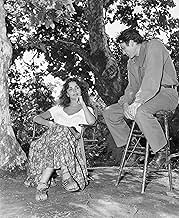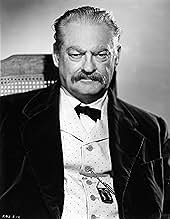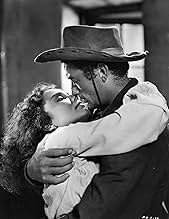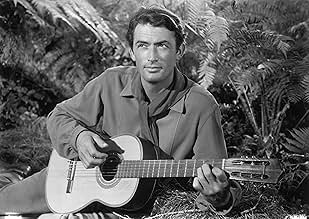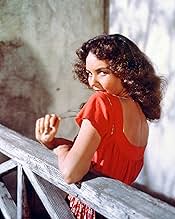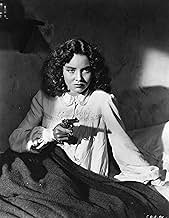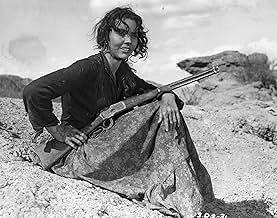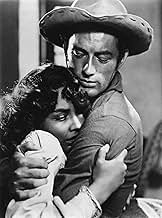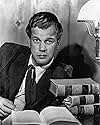VALUTAZIONE IMDb
6,7/10
10.071
LA TUA VALUTAZIONE
Aggiungi una trama nella tua linguaBeautiful, biracial Pearl Chavez becomes the ward of her dead father's first love and finds herself torn between two brothers, one good and the other bad.Beautiful, biracial Pearl Chavez becomes the ward of her dead father's first love and finds herself torn between two brothers, one good and the other bad.Beautiful, biracial Pearl Chavez becomes the ward of her dead father's first love and finds herself torn between two brothers, one good and the other bad.
- Candidato a 2 Oscar
- 3 vittorie e 4 candidature totali
Griff Barnett
- The Bordertown Jailer
- (non citato nei titoli originali)
John Barton
- Party Guest
- (non citato nei titoli originali)
Recensioni in evidenza
No need to recap the plot.
One thing about this overblown fandango— once seeing it, you won't forget it. How could anyone when everything is done to such tasteless excess. Poor Pearl (Jones). Apparently, Jones was told her part was that of a hot-blooded wench, which she unfortunately took to mean parboiled. It's hard not to laugh at the first hour when she acts like a nympho on steroids, tossing hair and leering wildly like pampas grass in a windstorm. Not far behind is that vintage ham Lionel Barrymore doing his usual blustery bit, like we won't get his hard-bitten patriarch unless he takes it into hyper speed. And who could have guessed that the usually constricted and constrained Gregory Peck could actually over-act. I think it was his first and last time—good thing, too.
It's possible to go on about the unrelenting excess— the sunsets that appear to hemorrhage, a musical score that's as necessary as sugar on molasses, and a loony ending that defies parody. But you get the idea. Too bad so much money and effort went into such a generally overheated result. Only Cotten, Gish and the black stallion come through unscathed. I'm thinking RKO could have made a dozen worthwhile programmers on the same budget. As things turned out, Selznick did his beloved Jones no favors with this one. It's hard to believe the man responsible for Gone with the Wind (1939) is also responsible for this swollen mess.
One thing about this overblown fandango— once seeing it, you won't forget it. How could anyone when everything is done to such tasteless excess. Poor Pearl (Jones). Apparently, Jones was told her part was that of a hot-blooded wench, which she unfortunately took to mean parboiled. It's hard not to laugh at the first hour when she acts like a nympho on steroids, tossing hair and leering wildly like pampas grass in a windstorm. Not far behind is that vintage ham Lionel Barrymore doing his usual blustery bit, like we won't get his hard-bitten patriarch unless he takes it into hyper speed. And who could have guessed that the usually constricted and constrained Gregory Peck could actually over-act. I think it was his first and last time—good thing, too.
It's possible to go on about the unrelenting excess— the sunsets that appear to hemorrhage, a musical score that's as necessary as sugar on molasses, and a loony ending that defies parody. But you get the idea. Too bad so much money and effort went into such a generally overheated result. Only Cotten, Gish and the black stallion come through unscathed. I'm thinking RKO could have made a dozen worthwhile programmers on the same budget. As things turned out, Selznick did his beloved Jones no favors with this one. It's hard to believe the man responsible for Gone with the Wind (1939) is also responsible for this swollen mess.
PURE OPERA. From the scenic backdrops seething in passionate colors to Jennifer Jones' over-ripe performance and Dimitri Tiomkin's tempestuous score...'Duel In The Sun' isn't just another soapy oater, it is the ultimate soapy oater. Brimming with more bad taste than any screenwriter could possibly misconceive, this Selznick classic is the penultimate guilty viewing pleasure...if you like you're Westerns on the sleazy side that is!
The performances are all unapologetically over-the-top, with Ms. Jones, in an Oscar winning performance no less, as Pearl Chavez, the 'half-breed' vixen torn between lust for Gregory Peck's Lewt McCanles, the bad-boy brother gone badder, and the 'save-me-from-myself' brand of love for Joseph Cotten's Jesse McCanles, the good brother with not-a-whole-heck-of-alot of sex appeal going for him. In between all this indecision, Ms. Jones sets fire to the scenery with as many sultry leers and poses as, I suppose, the censors of the time would permit her. "I'm TRASH, TRASH, TRASH," Pearl exclaims. And that about sums it all up. In spades! I should also make mention of the other Oscar winning performance, that by the venerable Lillian Gish as Laura Belle McCanles who, in perhaps the most painfully rapturous sequence, resurrects her silent film training in a tour-de-force of physical acting that, in less capable hands, would only be embarrassing. Not that you won't be tempted to laugh mind you, even Grand Opera, at the best of times, isn't this exquisitely sublime. And then there is Butterfly McQueen...as the befuddled maid (what else)...in the only role written for obvious comedic effect, whose long-winded sincerity couldn't be the more perfect foil for a hurried house full of whitees with nothing but sex on the brain...
On the technical side, it is an unquestionably ravishing film to look at. In glorious Technicolor, the 'Old West' never looked more mythic or more prone to tragedy...the 'campy' side that is. And, yet once more, Dimitri Tiomkin finesses our ears with a resounding melody of wide open spaces and of still bigger ambitions and desires, culminating in a symphonic tempest for two ill-fated (or over-sexed) lovers who could only be united in death.
WOW, this picture is right off the Harlequin Romance map! And I enjoyed every minute of it.
The performances are all unapologetically over-the-top, with Ms. Jones, in an Oscar winning performance no less, as Pearl Chavez, the 'half-breed' vixen torn between lust for Gregory Peck's Lewt McCanles, the bad-boy brother gone badder, and the 'save-me-from-myself' brand of love for Joseph Cotten's Jesse McCanles, the good brother with not-a-whole-heck-of-alot of sex appeal going for him. In between all this indecision, Ms. Jones sets fire to the scenery with as many sultry leers and poses as, I suppose, the censors of the time would permit her. "I'm TRASH, TRASH, TRASH," Pearl exclaims. And that about sums it all up. In spades! I should also make mention of the other Oscar winning performance, that by the venerable Lillian Gish as Laura Belle McCanles who, in perhaps the most painfully rapturous sequence, resurrects her silent film training in a tour-de-force of physical acting that, in less capable hands, would only be embarrassing. Not that you won't be tempted to laugh mind you, even Grand Opera, at the best of times, isn't this exquisitely sublime. And then there is Butterfly McQueen...as the befuddled maid (what else)...in the only role written for obvious comedic effect, whose long-winded sincerity couldn't be the more perfect foil for a hurried house full of whitees with nothing but sex on the brain...
On the technical side, it is an unquestionably ravishing film to look at. In glorious Technicolor, the 'Old West' never looked more mythic or more prone to tragedy...the 'campy' side that is. And, yet once more, Dimitri Tiomkin finesses our ears with a resounding melody of wide open spaces and of still bigger ambitions and desires, culminating in a symphonic tempest for two ill-fated (or over-sexed) lovers who could only be united in death.
WOW, this picture is right off the Harlequin Romance map! And I enjoyed every minute of it.
Well, it's obvious that Selznick was trying his best to recapture that GWTW magic...but this is an unbelievably inept failure. Here's what you can expect from this overblown sex-western:
--Jennifer Jones (in pancake make-up so orange that she put me more in mind of an Oompa-Loompa than the half-breed we're supposed to see) apparently directed to act as though she's Scarlett O'Hara with a lobotomy and bad grammar.
--Gregory Peck as rogue murdering rapist and the apple of his daddy's eye. At one point even doing a pretty decent vocal imitation of Clark Gable -- too bad it's just the voice.
--Lionel Barrymore lazily repeating his "It's a Wonderful Life" role from the same year -- wheelchair & grumpiness standing in for effort.
--Butterfly McQueen as kerchiefed ditzy maid. Hmmm, wonder where they got that idea?
All in all, a miserable movie experience. You'd think that since they cribbed from the best it'd have turned out better! Go figure.
--Jennifer Jones (in pancake make-up so orange that she put me more in mind of an Oompa-Loompa than the half-breed we're supposed to see) apparently directed to act as though she's Scarlett O'Hara with a lobotomy and bad grammar.
--Gregory Peck as rogue murdering rapist and the apple of his daddy's eye. At one point even doing a pretty decent vocal imitation of Clark Gable -- too bad it's just the voice.
--Lionel Barrymore lazily repeating his "It's a Wonderful Life" role from the same year -- wheelchair & grumpiness standing in for effort.
--Butterfly McQueen as kerchiefed ditzy maid. Hmmm, wonder where they got that idea?
All in all, a miserable movie experience. You'd think that since they cribbed from the best it'd have turned out better! Go figure.
This movie is like a painting by an old master that hangs in a museum--we may not be moved by it, but we can still appreciate the artistry. Its most notable feature is the director, King Vidor, master of silent film making. As you might expect, many of the important scenes have little or no dialog. In one scene between Lionel Barrymore and Lillian Gish, he rambles on about their life together, while she strains to get out of her sickbed and crosses slowly to him, the entire distance transfigured by the depth of her love for him. Gish was a great star of silent film, with a wonderful, expressive face, full of compassion and grace. In another scene that happens under quite different circumstances, Jennifer Jones crawls to Gregory Peck, the man she loves, also without words, evincing great sorrow and quiet dignity. In both cases, the women prove they are far more noble than the men who love them so badly. Jones also has a mobile face, together with a beautiful, resonant voice. No film that has these two ladies at its center should be missed. In addition, the film has two marvelous scenes that, at the time of its making, would have been just as impressive as some of today's special effects wonders: In the first, about 20 armed horsemen face a crowd of railway workers, including some chinese, clothed in authentic period dress, with a steam engine in the background. As the tensions mount, a troop of mounted cavalry, about 100 strong, ride onto the set, filmed on location (judging by the saguarros and ocatillos) in Arizona. This was a tour de force of filmmaking at a time when shooting on location was rare. In the second scene, a train under a full head of steam jumps the tracks and plows down an embankment. Filmed in early technicolor, this movie has lush exteriors and panoramas of rich desert color. Two more character actors should be mentioned, both of whom steal every scene they enter: Butterfly McQueen, the maid whose comments are both simple and profound, and Walter Huston, as the crusty sheriff who doubles as a preacher during a funeral.
Well, it's no Gone With The Wind. Selznick, again, features his wife, Jennifer Jones, in a different role than the usual wholesome roles she was expected to do. Portrait Of Jennie, Since You Went Away and Song of Bernadette. Jones has a bad habit of over-acting if allowed to do so. Example is Tender Is The Night, Man In A Grey Flannel Suit, Ruby Gentry and Love Letters. It takes a strong director to tone her down. King Vidor lost control of her in this or Selznick had too much control. Her performance consisted of a low gutteral voice and a sashaying walk. Not much else.
On the other hand, excellent supporting roles were played by Lionel Barrymore and Lilian Gish. They stole the picture in this viewer's opinion. Gregory Peck and Joseph Cotton went through the paces of what they were asked to do as rivalry brothers. But you kind of knew their hearts weren't in it. Then there was the presence of Butterfly McQueen in her usual Gone With The Wind type performance. Charles Bickford in an undistinguished role was wasted as was Herbert Marshall and Sidney Blackner [all good actors]. An impressive cast when the titles came on, but what followed was not what you wanted to see.
I got tired of seeing Jennifer Jones strutting about making faces of some indian half-breed. Boring. Oh, I liked the horse [the pinto] that she rode. He was terrific. Best to see this on video. Doesn't come off that bad. But it is a cornball western farce.
On the other hand, excellent supporting roles were played by Lionel Barrymore and Lilian Gish. They stole the picture in this viewer's opinion. Gregory Peck and Joseph Cotton went through the paces of what they were asked to do as rivalry brothers. But you kind of knew their hearts weren't in it. Then there was the presence of Butterfly McQueen in her usual Gone With The Wind type performance. Charles Bickford in an undistinguished role was wasted as was Herbert Marshall and Sidney Blackner [all good actors]. An impressive cast when the titles came on, but what followed was not what you wanted to see.
I got tired of seeing Jennifer Jones strutting about making faces of some indian half-breed. Boring. Oh, I liked the horse [the pinto] that she rode. He was terrific. Best to see this on video. Doesn't come off that bad. But it is a cornball western farce.
Lo sapevi?
- QuizAccording to King Vidor, director Josef von Sternberg was hired only as a lighting expert by David O. Selznick in order to give his wife--and the film's star--Jennifer Jones a more glamorous look.
- BlooperThe opening shows saguaro cacti in the valley. The film is supposed to take place in Texas, but southern Arizona is the only place in the US with saguaro cacti, unless they've been transplanted.
- Citazioni
The Sinkiller: Under that heathen blanket, there's a full-blossomed woman built by the devil to drive men crazy.
- Versioni alternativeThe original "roadshow" version ran 144 minutes. The additional 16 minutes, over the commonly-shown 128 minute version, consisted of a musical "prelude," an "overture" (which contained a spoken prologue, by Orson Welles), and exit music, but no additional scenes in the film. The two additional opening sequences were each inadvertently given the other's label.
- ConnessioniEdited into Histoire(s) du cinéma: Une histoire seule (1989)
I più visti
Accedi per valutare e creare un elenco di titoli salvati per ottenere consigli personalizzati
Dettagli
Botteghino
- Budget
- 8.000.000 USD (previsto)
- Lordo Stati Uniti e Canada
- 20.408.163 USD
- Lordo in tutto il mondo
- 20.428.771 USD
- Tempo di esecuzione2 ore 26 minuti
- Proporzioni
- 1.37 : 1
Contribuisci a questa pagina
Suggerisci una modifica o aggiungi i contenuti mancanti

Divario superiore
By what name was Duello al sole (1946) officially released in India in English?
Rispondi

